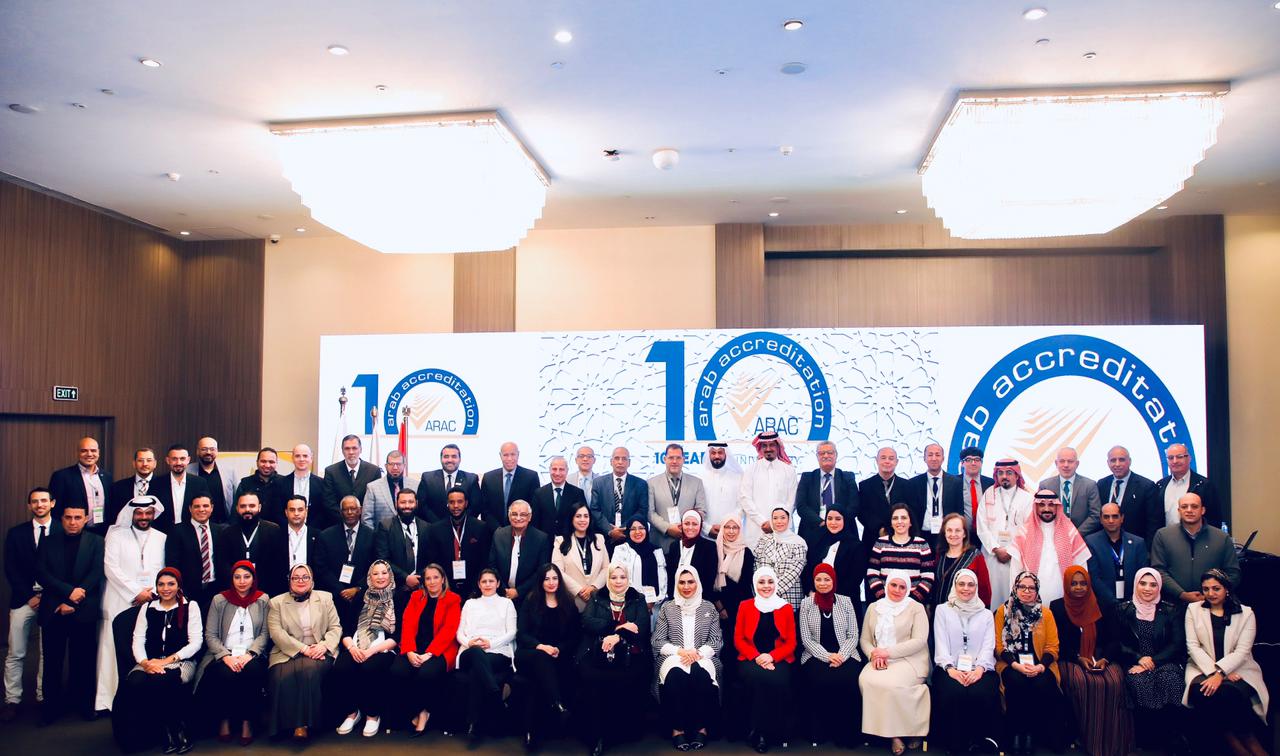
I. ARAC MLA Signatories
Following the latest ARAC MLA Group decision ARAC has 5 MLA signatories as the following:

II. ARAC 10th Annual meetings:
After much planning, ARAC has held very successfully its 10th Annual Meetings in Cairo, Egypt, from 04th to 8th December 2022 hosted by the Egyptian Accreditation Council [EGAC]. The schedule for these meetings was exceptionally busy and particularly so given the significant number of Committees & Working Groups meetings and events such as the 2nd ARAC community stakeholders workshop, the celebration of ARAC 10th anniversary and the capacity building activities that included Regional training workshops on Remote Assessments/Peer Evaluations using the Augmented Reality Glasses and the key documents/records to prepare for the ARAC Peer Evaluation process.
Significant achievements were made at these meetings including the approval of the ARAC new strategy covering the period 2023-2025 and the decision to extend the ARAC MLA structure to include Proficiency Testing Providers, Reference Material Producers & Biobanking (all level 2) and Medical Devices Management System (MDMS), Information Security Management Systems (ISMS), Occupational Health & Safety Management Systems (OH&S MS) and Educational Organizations Management Systems (EOMS) (at level 4).
III. ARAC Stakeholders Community Workshop in Egypt:
The awareness stakeholder workshop was conducted on 05th December 2022 with more than 150 participants from the ARAC stakeholder community representing the conformity assessment bodies, regulatory authorities, industry & trade associations and consumer associations in Egypt.
During this workshop, the participants stressed the role that ARAC plays in the development of the accreditation and conformity assessment infrastructure in Egypt. The aim of this workshop was for stakeholders in Egypt to have a better understanding of the value of accreditation and accredited services, and in particular, for regulators to recognize and accept accredited conformity assessment results covered under the ILAC MRA, IAF MLA and ARAC MLA.
IV. ARAC New Strategy 2023-2025
ARAC members have adopted a new ARAC strategy to guide ARAC work through the period 2023-2025 with a new vision “The leading accreditation group facilitating regional and global trade and supporting sustainable development”. It is based on the 4 pillars: International recognition, Operational excellence, Cooperation & Partnership and Capabilities Development. The main objective is to strengthen all interested parties’ confidence in accreditation and enhance ARAC into a professional, efficient service provider serving the ARAC Accreditation Bodies’ Members and stakeholders.
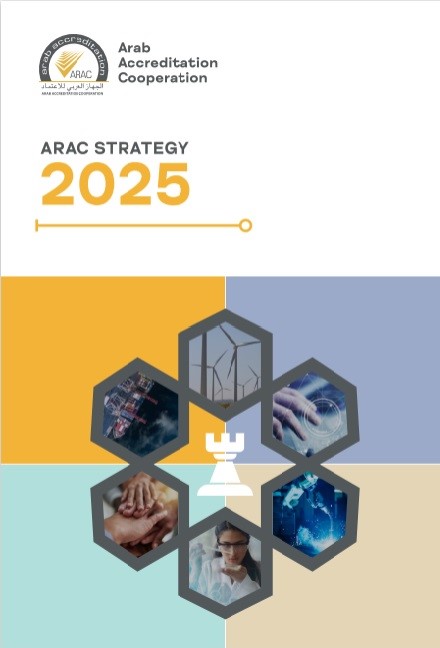
CoverPage_ARAC Strategy2025
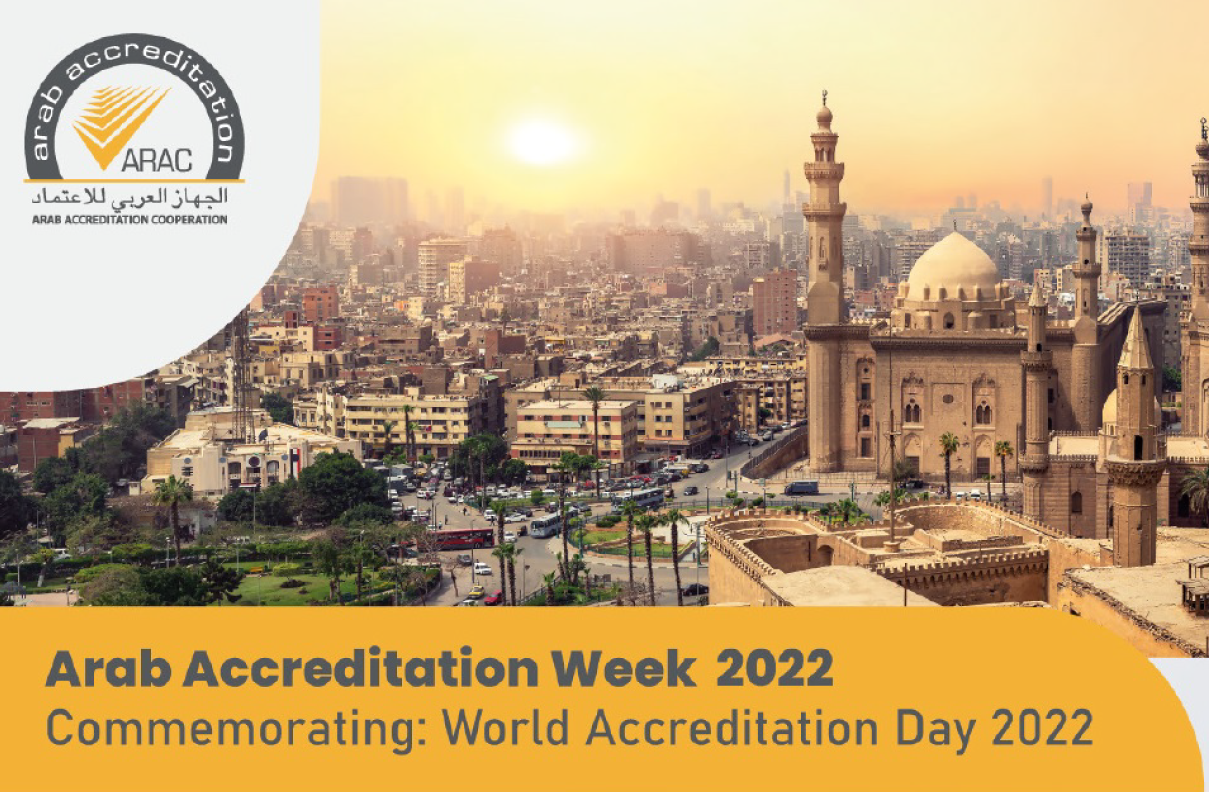
1. ARAC trains newcomers to ARAC peer evaluation teams
Emirates International Accreditation Centre EIAC in Dubai hosted the 3rd ARAC newcomer peer evaluators training course during the period 27-31 March 2022 to impart future teams of ARAC peer-evaluators with a view to improving ARAC peer-evaluation activities.
The training targeted potential ARAC peer-evaluators from the assessors’ staff of ARAC Members. Its objective was to thoroughly introduce the ARAC peer-evaluation process in order to enable the participants to take part in future evaluations of ARAC accreditation body members.
Eighteen lead assessors from five ARAC accreditation body members took part in this training course. The participants were selected according to ARAC Procedures, while giving priority to those applicants who had more competence for the ARAC MLA scopes that lacked resources in terms of peer-evaluation (Inspection, Management System Certification, Calibration, Medical Testing, Product Certification and Certification of Persons).
The training was led by 2 trainers: Mr Gokhan Birbil from TURKAK and Mr Mahmoud Eltayeb from EGAC and the ARAC secretariat covered the topics related to evaluator training and management.
The training, based on both presentations and group work, considered the following points:
As a follow-up of this training course, the successful participants will take part in future evaluations of ARAC-Member Accreditation Bodies (ABs), first as trainee team members, then as team members.
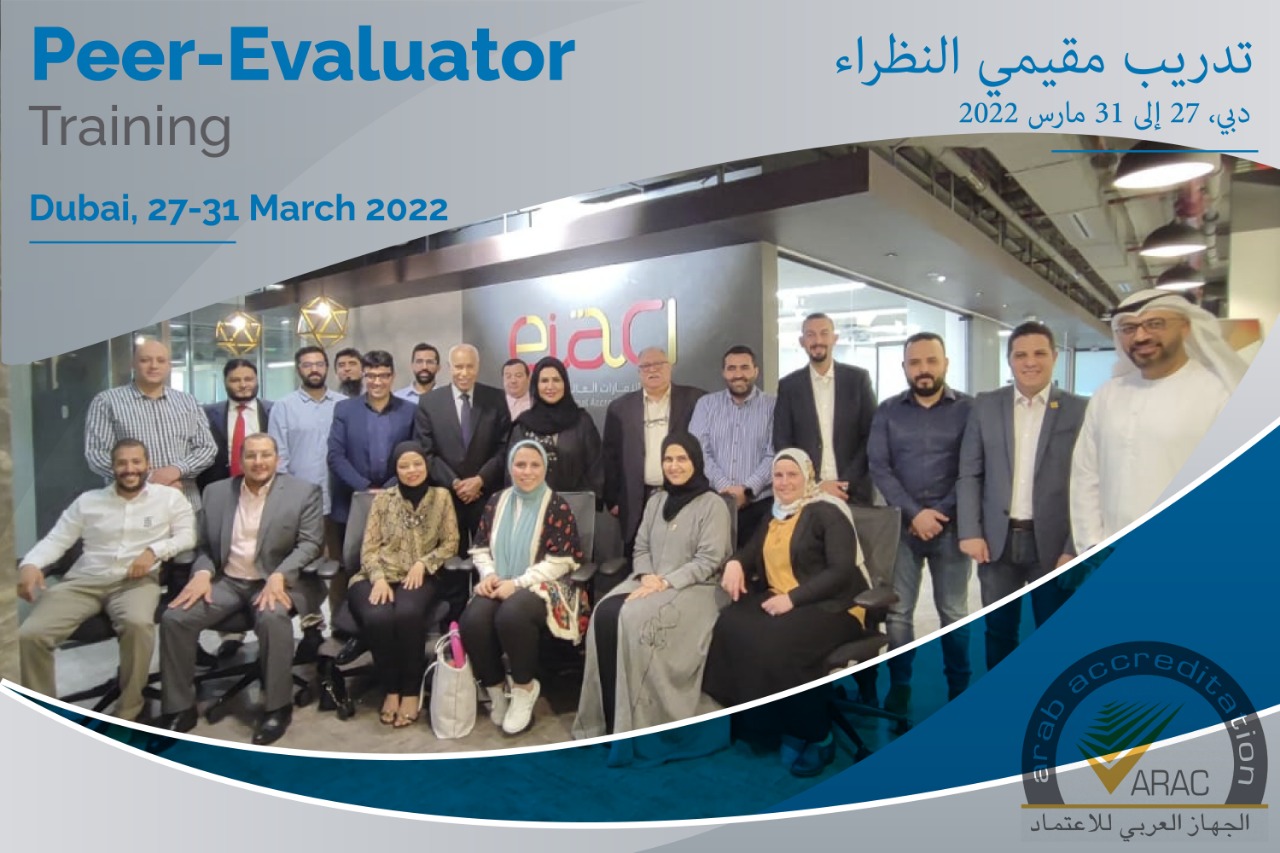
2. Arab Accreditation Week 2022:
In its third edition and on the occasion of World Accreditation Day 2022 ARAC organized the Arab Accreditation Week (AAW) during the period 05-09 June 2022 under the theme “Together towards enhancing the role of accreditation in supporting the Sustainability in Economic Growth and the Environment in the Arab region”.
Several online activities held during the AAW demonstrated how the accreditation infrastructure in the Arab region could be further developed, drawing attention to how accreditation and conformity assessment provide global solutions for global issues and how ARAC is seeking to help organizations measure, manage and/or report sustainable economic growth and environmental performance, in addition to capacity building activities that implemented to strengthen the ARAC members competencies.
2.1 Discussion workshop on ARAC new Strategy 2023 to 2025
Further to the ARAC Executive Committee decision to develop the ARAC new strategy for the period 2023-2025, this workshop aimed to identify the main areas of specific importance for the development of the new strategy based on SWOT (Strength, Weakness, Opportunity and Threat) & PEST (Political, Economical, Social, and Technological) analysis of the current situation.
The inputs from these main areas will provide the basis for formulating the ARAC current position and a desired position for 2025. In order to reach the desired position, the new strategy should cover some strategic and specific objectives, actions and milestones, an updated vision and mission and a set of core values.
2.2 ARAC Capacity Building activities:
2.2.1 Regional Workshop on accreditation of Biobanking
Following the extension of the ILAC MRA to include the accreditation of biobanks as a Level 2 activity using, ISO 20387 “Biobanking – General requirements for biobanking” as the Level 3 normative document, this regional workshop will help Accreditation Body personnel and other ARAC stakeholders interested in the development of accreditation in this exciting area.
The main purpose of this workshop is to provide an overview of ISO 20387 and share the experiences of using the standard from both the Biobank and Accreditation Body perspectives and consider the steps needed to establish an accreditation program for Biobanking.
2.2.2 Regional Workshop on the new IAF Mandatory Document IAF MD 25
In order to harmonize the accreditation practices among ARAC members and support the enhancement of members’ capacities in operating existing accreditation schemes of common interest to ARAC members, ARAC organized the regional workshop on the new IAF MD25:2022 “Criteria for Evaluation of Conformity Assessment Schemes”. The objective of this session is to prepare the ABs as well as the certification bodies (CBs) in the Arab region to fulfil the requirements of this MD.
These online training sessions covered the minimum requirements for conformity assessment schemes (CAS) to be applied by ARAC member ABs when evaluating national, regional or international CAS to ensure they meet requirements specified in ISO/IEC 17011, Clause 4.6.3.
2.3 Webinar on the role of Accreditation and Conformity assessment in achieving sustainability
Economic and environmental objectives in the Arab region
The event, which comes in the context of the implementation of ARAC communication strategy, will further contribute to strengthen the visibility of ARAC inside and outside the accreditation community, supporting recognition and acceptance of the ARAC MLA and services/products provided under accreditation issued by the ARAC AB Members.
By the end of the awareness sessions, the participants had good understanding on how accreditation and conformity assessment provide global solutions for global issues and how ARAC is seeking to help organizations measure, manage and/or report sustainable economic growth and environmental performance.
2.4 Celebration of the WAD 2022
The online celebration included presentations from ARAC and the regional partner organizations to highlight the role of conformity assessment and accreditation in achieving Sustainability in Economic Growth and the Environment in the Arab region. In addition, examples shared on how accreditation and CA services may be applied to meet objectives such as increasing trade, addressing health and safety concerns, contributing to the fight against climate change and protecting the environment by ensuring compliance with standards.
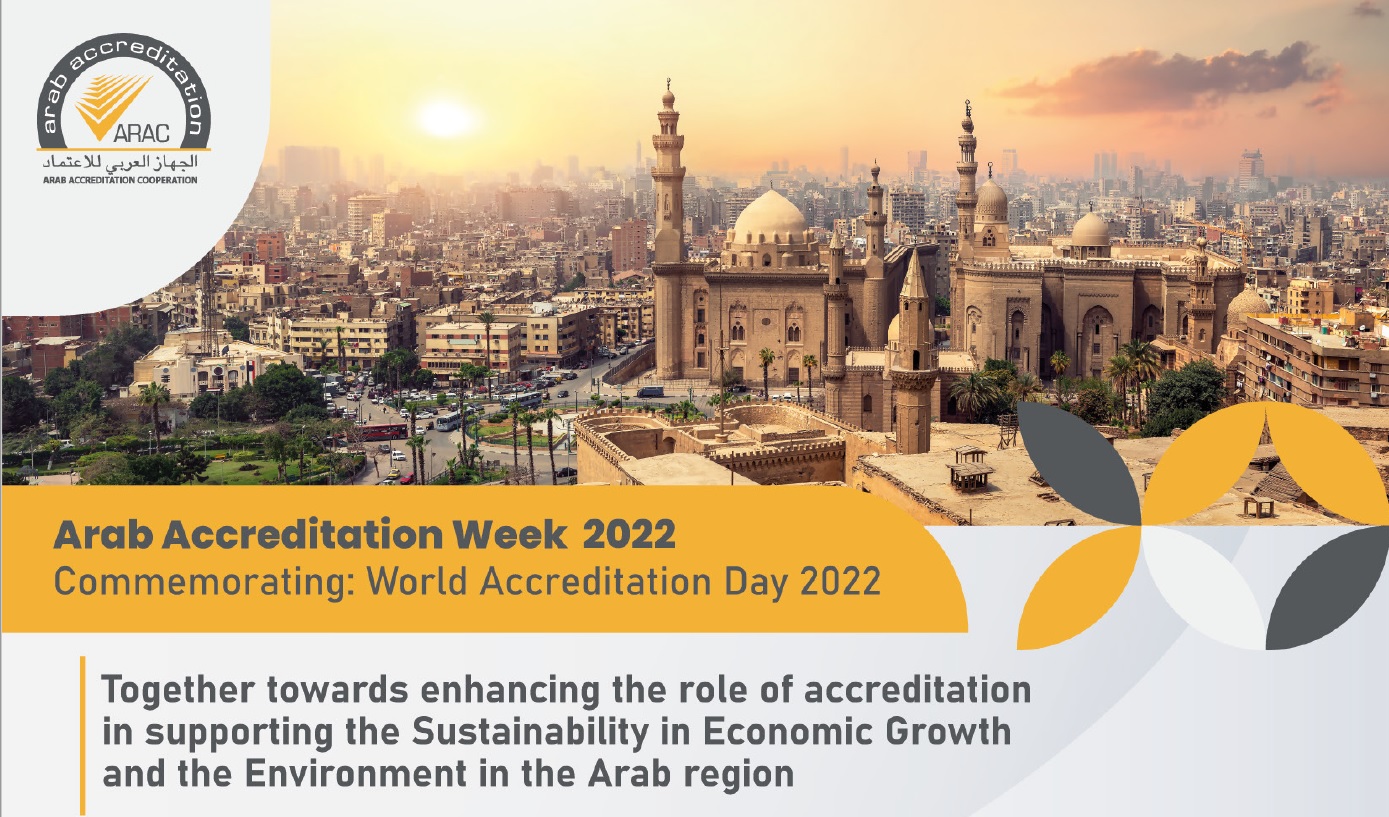
3. ARAC Proficiency Testing Programs:
With the aim to enhance the measurement capability and traceability in countries and economies of the Arab region through a better regional scientific infrastructure, and with the participation of more than 300 laboratories from the Arab region, seven Proficiency Testing (PT) programs have been implemented so far under the auspice of ARAC:
In addition, and following the request of the ARAC Technical Committee to implement a new SARS-CoV-2 (COVID-19) Molecular PT Program, ARAC initiated ARAC PT 007 program in June 2022 with the participation of more than 70 accredited medical laboratories in the Arab region
It should be highlighted that that the results of the participation of the ARAC AB laboratories in the ARAC PT programs are using the peer evaluation process conducted by ARAC with the aim to check the compliance of ARAC ABs with ILAC/IAF A2 and ARAC applicable requirements. In addition, this PT program will enhance the measurement capability and traceability of measurements in countries and economies of the Arab region through a better regional scientific infrastructure.

The preferred means to demonstrate the competence of a notified body is accreditation by the National Accreditation Body. To ensure that the National Accreditation Bodies accredit notified bodies throughout Europe (EU, EFTA, and Turkey) in a harmonized way, EA published the Document on Accreditation for Notification Purposes (EA-2/17). The application of this document is mandatory for all National Accreditation Bodies when accrediting a conformity assessment body to become a notified body. EA-2/17 also applies to bodies performing assessment and verification of constancy of performance under the Construction Products Regulation.
The main purpose of the April 2020 revision was the definition of the preferred harmonised standard(s) for the accreditation of notified bodies. That has been done for each Union harmonisation legislation and module, the specific conformity assessment procedure.
Within three years from publication, all accredited notified bodies shall comply with EA-2/17:2020.
The EA Working Group “Accreditation for Notification” (AfN) performed a consultation among the National Accreditation Bodies regarding the implementation of EA-2/17:2020.
The results demonstrated that many National Accreditation Bodies have already implemented EA-2/17: 2020, which means that the accredited notified bodies comply with EA-2/17.
The most critical issue is to transition all accredited notified bodies to the (preferred) harmonized standard for accreditation as defined in EA-2/17. A National Accreditation Body can only deviate from the application of this standard for a specific legislation and module if the national authority requires another harmonized standard.
The notified bodies shall meet the requirements stipulated in the applicable harmonized standard and the additional requirements indicated in the Union Harmonisation Legislation. Relevant harmonized standards for the accreditation of Conformity Assessment Bodies seeking notification are:
CETA Webinar and partnership renewed between EA and SCC
The Delegation of the European Union in Canada and the Directorate-General for Trade, in collaboration with the Directorate-General for Internal Market, Industry, Entrepreneurship and SMEs, and the Service for Foreign Policy Instruments (FPI) of the European Commission, organized a webinar called ‘How to make use of the EU-Canada Comprehensive Economic and Trade Agreement (CETA) Protocol on Conformity Assessment and whether to extend its scope.
This online seminar was held on the 8th of September 2022 and was part of a series of events organized around the fifth anniversary of CETA’s provisional entry into force. The trade agreement remains a core driver of the EU’s privileged and solid relationship with this close ally and like-minded partner. The current geopolitical context creates momentum for even closer cooperation between the EU and Canada.
CETA includes a Protocol on the Mutual Acceptance of the Results of Conformity Assessment (the CA Protocol). This Protocol establishes mutual recognition of European and Canadian National Accreditation Bodies and Conformity Assessment Bodies to accept the results of each other’s conformity assessment. Implementing the CA Protocol enables the industry to certify products to Canadian requirements in the EU and vice versa. This mutual acceptance of conformity assessment results allows for cost reduction for businesses and consumers and freedom of trade by eliminating technical barriers.
EA and the Standards Council of Canada (SCC) signed a Bilateral Cooperation Agreement (BCA) which was renewed on 29th September 2022. The agreement establishes the conditions and procedures for cooperation between EA and SCC for technical support of activities aimed at mutual recognition of National Accreditation Bodies (NAB) and accredited Conformity Assessment Bodies operating in the EU and Canada and strengthens the implementation of the Protocol, specifically for more product sectors.
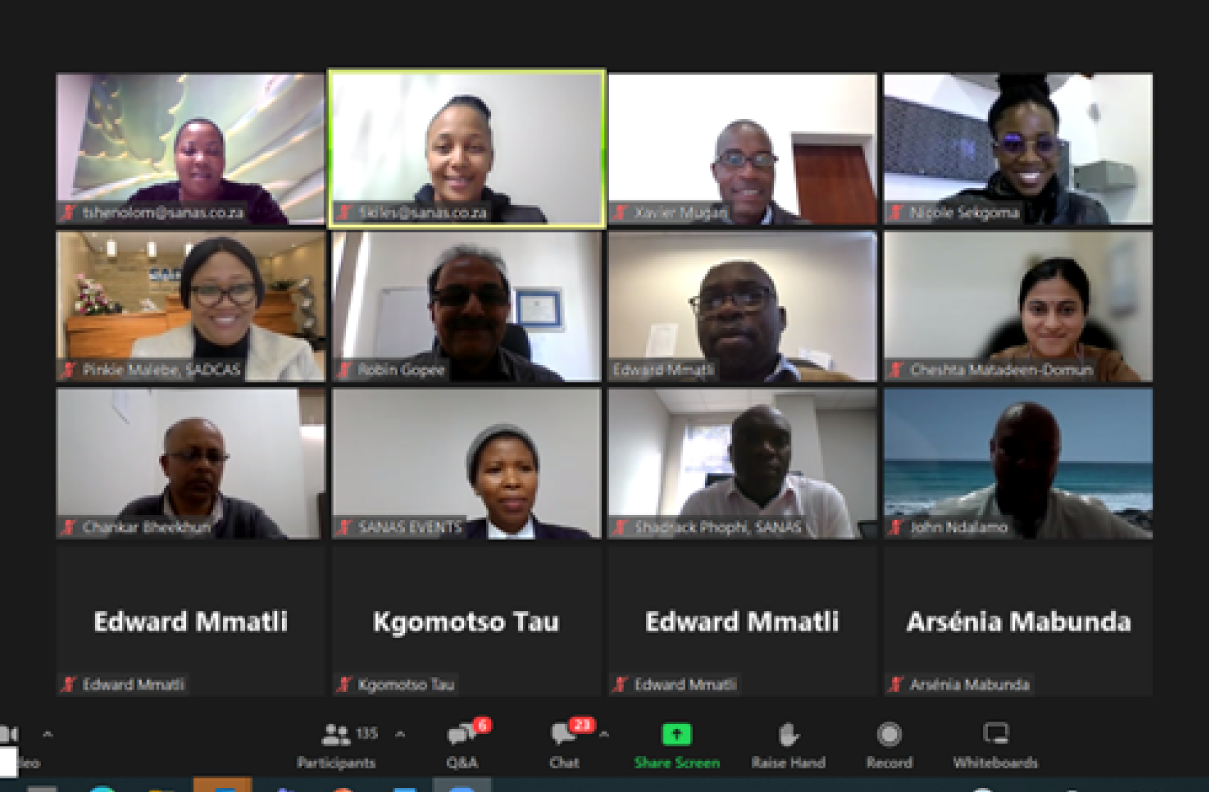
The inaugural Southern African Development Community Cooperation in Accreditation (SADCA) Regional World Accreditation Day (WAD) was successfully celebrated virtually on the 9th June 2022 under the theme: Accreditation: Sustainability in Economic Growth and the Environment. The theme highlights how accreditation supports 9 of the 17 United Nations Sustainable Development Goals (SDGs) through the provision of a trusted platform for defining, developing and verifying requirements for products and services while helping to ensure and demonstrate that products and services meet specified requirements.
The SADCA Regional WAD workshop was attended by more than 170 participants from various backgrounds including the public and private sectors, SADCA members, conformity assessment bodies, and several associations within the Southern African Development Community (SADC) region.
In his capacity as the SADCA Marketing and Communications Committee (MCC) Chair and the Master of Ceremonies for the event, Mr Edward Mmatli, introduced the presenters while SADCA Chair, Mr. Chankar Beekhun gave the welcome remarks.
The following presentations were given during the workshop:
Presentations were followed by a screening of a video produced by ILAC and IAF entitled, “Accreditation: Sustainability in Economic Growth and Environment”. The audience posted comments and questions which were promptly addressed by the organisers and presenters, making for an interactive and engaging webinar experience. Ms. Tshenolo Molamu, SADCA MCC Vice Chair, gave the closing remarks. Various WAD promotional materials that were developed by ILAC and IAF were utilised during the preparation of the event. It is hoped that following the successful regional World Accreditation celebration, SADCA would continue to organise the regional WAD event in future over and above the celebrations that are expected to be held at national level.
SADCA is a cooperation of accreditation bodies in the Southern African Development Community (SADC) region. It is a Technical Barriers to Trade (TBT) Cooperation Structure established under the TBT Annex to the SADC Protocol on Trade. SADCA currently comprises of a total of 21 Members covering 15 out of the 16 SADC Member States:
SADCA’s mission is to manage and expand accreditation recognition arrangements that support SADC industrialisation, facilitate trade and regional integration through credible, reliable and sustainable conformity assessment services that will contribute to the SADC region’s sustainable development.

The Southern African Development Community Cooperation in Accreditation (SADCA) has published its 4th strategic plan. The strategic plan covers the period 2022 to 2026. The process started with the development of the Strategic Plan survey questionnaire which was subsequently circulated to stakeholders for completion. Inputs from stakeholders were then collated and analysed, following which two strategic planning workshops were successfully held, one with stakeholders on 25 March 2021 and then with the SADCA Executive Committee on 26 March 2021. All inputs were then consolidated into a draft strategic plan which was then circulated to all members for comment. The comments received were then considered by the Executive Committee following which the final draft strategic plan was circulated to all members and subsequently approved through Resolution 14 of the 25th SADCA General assembly held on 6 May 2021.
With a fresh design and colourful outlook, the 2022 to 2026 Strategic Plan covers the Chairperson’s Statement; SADCA mandate and aims, vision, mission and values; situation analysis; performance environment; organisational environment; performance information; and links to the long-term infrastructure and other capital plans, private partnerships, financial plan, budget, and indicator description.
Speaking during the SADCA General Assembly, Mrs Maureen Mutasa (SADCA Chair) thanked members for their input into the strategic plan; Dr Josias, the facilitator of the strategic planning process; and the SADCA Executive Committee for their hard work which has resulted in a well thought out strategy for the 2022 to 2026 period, during which the SADCA Mutual Recognition will be internationally recognized. A plan that supports the SADC industrialization thrust and sustainable development in the region, facilitates trade and regional integration and enhances human capital development and competence. A plan where SADCA will work towards self-sustenance of its operational activities and a plan where SADCA’s thrust will also focus on awareness creation on its MRA and designed to also increase membership in SADCA especially private sector involvement in its activities. A plan that avoids unnecessary duplication with the African Accreditation Cooperation (AFRAC). The 2022 to 2026 Strategic Plan was uploaded on the SADCA website and the link circulated to stakeholders for notification of its upload.
|
The Southern African Development Community Cooperation in Accreditation (SADCA) is a Cooperation of accreditation bodies in the Southern African Development Community (SADC) region. SADCA is a Technical Barriers to Trade (TBT) Cooperation Structure established under the TBT Annex to the SADC Protocol on Trade. SADCA currently has a total of 20 Members:
|
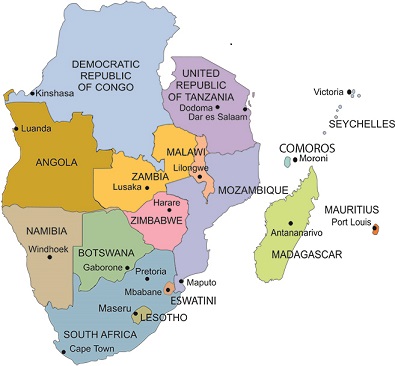 |

The 2021 edition of the International Congress of Metrology, held in Lyon, France, closed its doors on 9th September 2021. It was the first time the Congress was organised based on a hybrid model: conferences and roundtable talks being held simultaneously in Lyon and broadcasted online to the registered participants. This new model was very successful.
EA has been a partner of the Congress for 20 years and routinely present on the roundtables. In 2021, Maureen Logghe, the EA President, was accepted as a key speaker on the roundtable on “The Role of Metrology and Quality Infrastructures in the Transition to Industry 4.0”. We asked Maureen for her feedback on the event.
Being a speaker in a hybrid format, Maureen explains, creates new constraints and invites you to be creative when communicating to the public and presenting remotely. It takes some time to adapt to the hybrid model, particularly when engaging with participants you can see and, at the same time, those you cannot see and are raising their questions in writing only. Normally you would be able to interact directly with the audience, you can read the faces and how well your message has been received. This is not the case however, when you cannot see the participants on the other side of the screen. You have to change your method of communication to make sure all questions are answered and issues are communicated clearly. Exciting challenge!
On 8th September, the roundtable brought together all main actors of the international quality infrastructure involved in one way or another in what we call Industry 4.0. The EA President sat at the table with representatives of the International Laboratory Accreditation Cooperation (ILAC),, Organisation Internationale de Métrologie Légale (OIML), Industry, International Organization for Standardization (ISO) and the United Nations Industrial Development Organization (UNIDO).
All recognised that Industry 4.0 is no longer an issue for future discussion but rather a challenge we are facing at present. In our daily life we already use ‘connected’ objects and the internet is present in every facet of life, as illustrated by our ILAC colleague in their presentation on digital energy meters in our house. In industry or services, the applications of digitalisation are many and create new challenges for metrology, calibration, conformity assessment and accreditation, but also standardisation and regulations.
In Europe, the European Commission made Industry 4.0 a key European-wide challenge with a number of projects and initiatives in the Information & Communication Technology fields. Cybersecurity is just one example. The Cybersecurity Act will cover many areas, products, processes, supporting higher security and performance while protecting personal data. European legislations have for some time already incorporated in their contents the key challenges brought forward by Industry 4.0. however legislation should be future proof.
On the standardisation side, ISO/IEC 17011 has proved very recently to be up-to-date and fit for purpose as it already contained a definition of remote assessments. During the COVID-19 pandemic, its requirements enabled accreditation and accredited bodies to maintain their services remotely with the same level of reliability, competence and confidence. The standard requirements could be translated readily in the new procedures and processes supporting remote assessments. Working from home, by definition, has led to further development of existing and the introduction of new digital processes. ISO/IEC 17011, and the standards used for accreditation have not been an obstacle or a technical barrier. National Accreditation Bodies and Conformity Assessment Bodies have proven to be able to adapt and continue to meet the requirements. It has helped avoid discontinuity and maintain the quality chain in the market.
Testing of medical masks is a good example of how well the chain has been maintained, with manufacturers having to produce very quickly a lot of masks, laboratories to carry out the relevant tests and meet the urgent and big demand, accreditation bodies to perform the assessment of the labs and, ultimately, deliver accreditations to give confidence in the masks placed on the market.
The discussions around the table showed that all parties involved share converging views, interests and approaches. Industry 4.0 is not in the future, but in the present. Regulation, standardisation, conformity assessment, accreditation, all have had to adapt and anticipate “present future” changes. The issues of cybersecurity and artificial intelligence have been touched upon several times. Developing use of digital technologies, IA in particular in the many areas of metrology, calibration or in decision making processes gives rise to new challenges for conformity assessment and accreditation. All involved have to keep up with innovation and technology. EA and its members have proven to be innovative, developing use of technologies in their operations and taking up the new questions arising from use and exchange of personal data. Remote assessments have been implemented. Today, we are at the stage of sharing feedback and experience to reinforce our procedures while maintaining the necessary harmonisation. Back in 2017, EA had clearly prioritised digitalisation in its strategic development plan and now we can pick the fruits.
Even if convinced that the digital route is the route for the future, we have to be prudent. In the accreditation field, it cannot be sufficient just to only observe CAB staff performing tests and analyses remotely, there is still a need for further onsite assessment to see how they work. The human dimension is a major asset in conformity assessment processes. The purpose of accreditation remains confidence, it has not changed, and it cannot be based on virtual control only. Competence still needs face-to-face meetings, interviews and interaction. How to combine the tools and approaches will be the next challenge. It is already on the agenda for EA technical committees and EA members have a lot of experience to share, in many areas, from many different contexts and environments.
Furthermore the discussion in the roundtable panel showed that, individually, each actor cannot do it all. We are collectively, all involved in the quality infrastructure, that we will translate Industry 4.0 successfully in all aspects of economy and everyone’s daily life. This constitutes a fantastic incentive, we all have to make headway at the same pace, jointly.
Working together is nothing new for accreditors. Taking account of stakeholders and interested parties’ views and needs is well embedded in our daily work. We are ready and will continue interaction with all our partners, European and national regulators, industry, services, consumers, CABs. We are well aware of the risks and will take up the challenge.
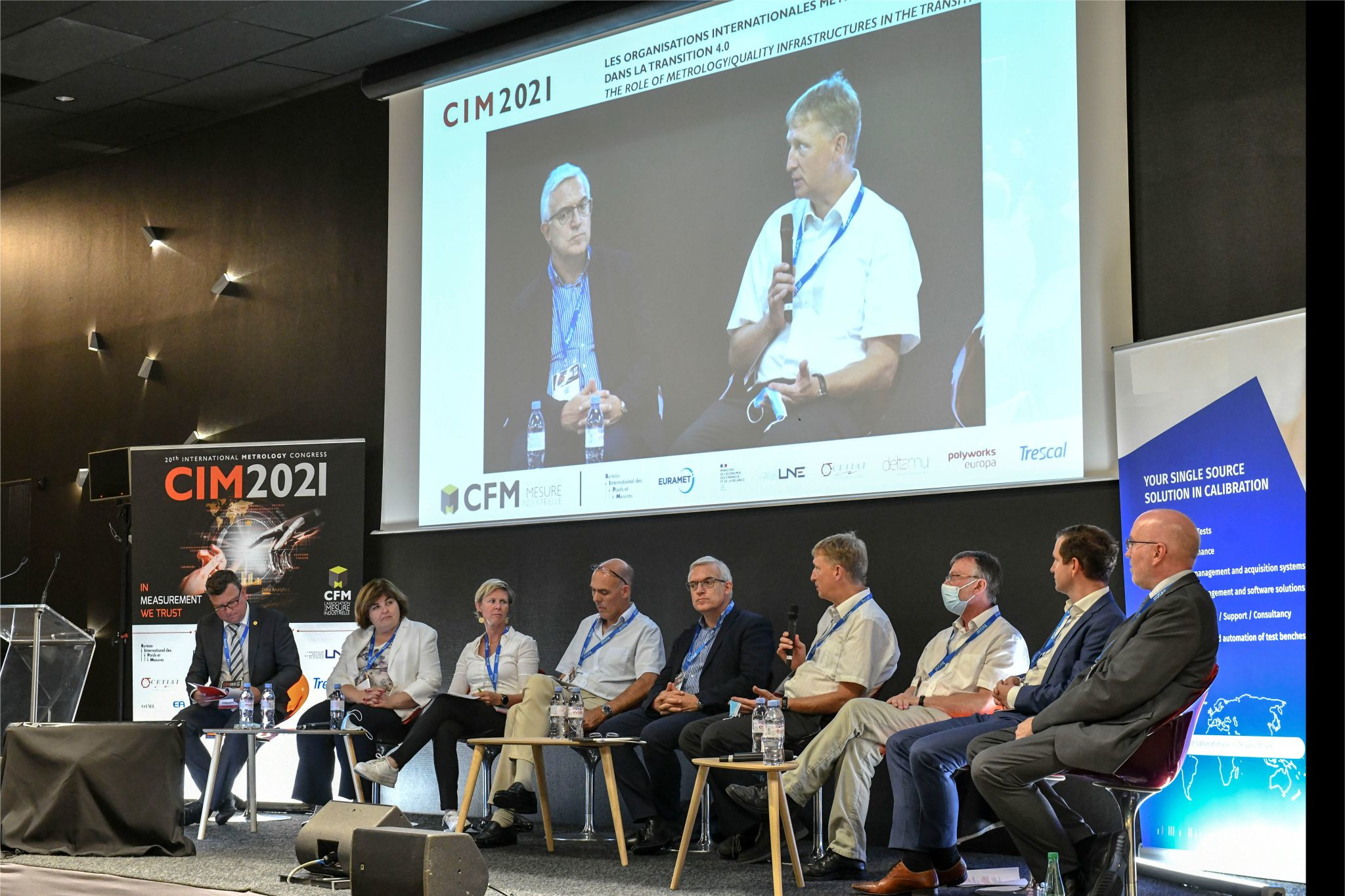

1. New ARAC MLA Signatory: Saudi Accreditation Center SAC
1.1 New ARAC MLA Signatory :
Following the acceptance of the Saudi Accreditation Center SAC as new ARAC MLA signatory, ARAC has 5 MLA signatories are the following:
|
ARAC MLA Signatory |
Calibration |
Testing |
Medical |
Inspection |
QMS |
EMS |
FSMS |
Product |
Persons |
|
EGAC |
Y |
Y |
Y |
Y |
Y |
Y |
Y |
|
|
|
EIAC |
Y |
Y |
Y |
Y |
Y |
Y |
Y |
Y |
Y |
|
GAC |
Y |
|
|
Y |
|
|
|
|
|
|
JAS-AU |
Y |
Y |
Y |
|
|
|
|
|
|
|
SAC |
Y |
Y |
|
Y |
|
|
|
|
|
2. ARAC Regional Workshops:
2.1 ARAC Regional Training Workshop on estimation and statement of uncertainty and the new version of “ILAC P14:09/2020 ILAC Policy for Measurement Uncertainty in Calibration”
With the participation of more than 100 ARAC AB’s personnel involved in the accreditation process [ARAC ABs staff, Lead Assessors, Technical Assessors and Technical Experts and decision makers], the ARAC online Regional on estimation and statement of uncertainty and the new version of “ILAC P14:09/2020 ILAC Policy for Measurement Uncertainty in Calibration” has been successfully conducted during the period 22nd – 23rd June 2021. The regional training workshop that was very ably facilitated by Eng. Mahmoud Eltayeb covered the requirements and guidelines for the estimation and statement of uncertainty in calibration and will support ARAC ABs members to implement the new requirements of ILAC P 14, which is based on the Guide to Uncertainty in Measurement (GUM) and retains the common understanding of the term CMC from the joint declaration issued by the BIPM and ILAC.
2.2 ARAC Regional Workshop on ISO/IEC 17043
ARAC conducted during the period 04 – 07 July 2021 an online regional training workshop on accreditation of the PT provider according to the requirements of ISO/IEC 17043 “Conformity assessment – General requirements for proficiency testing” with the participation of more than 100 ARAC AB’s personnel involved in the accreditation process as well as representative from ARAC Stakeholders’ members. These training sessions will support ARAC AB members to extend their activities in order to include the accreditation of proficiency testing providers, which covered the requirements for the competence and impartiality of proficiency testing providers and consistent operation of all proficiency testing schemes.
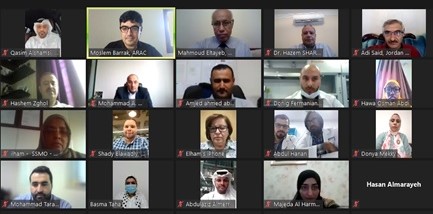
[Photo 01: Participants at the ARAC Peer Evaluators workshop on ISO/IEC 17043]
2.3 Regional Workshop on Metrological Traceability and the new version of ILAC P10:07/2020 ILAC Policy on Metrological Traceability of Measurement Results
in order to harmonize the accreditation practices among ARAC members and support the enhancement of members’ capacities in operating existing accreditation schemes of common interest to ARAC members, ARAC organized the regional workshop “on Metrological Traceability and the new version of ILAC P10:07/2020 ILAC Policy on Metrological Traceability of Measurement Results”. These online training sessions covered the Principles of metrological traceability and the new ILAC policy on metrological traceability of measurement results, which shall be implemented by the ARAC ABs MLA signatories no later than July 2021. In addition, the training sessions covered the ILAC policy with regard to the metrological traceability requirements for the conformity assessment activities where measurement is involved

[Photo 02: Participants at the ARAC Regional Workshop on Metrological Traceability]
2.4 ARAC Regional Workshop on the new version of P15:05/2020 Application of ISO/IEC 17020:2012 for the Accreditation of Inspection Bodies
ARAC conducted during the period 11-12 April 2021 an online regional training workshop on the new version of P15:05/2020 Application of ISO/IEC 17020:2012 for the Accreditation of Inspection Bodies with the participation of more than 80 ARAC AB’s personnel involved in the accreditation process as well as representative from ARAC Stakeholders’ members. This workshop will support ARAC AB members to prepare for the implementation of the new issue of ILAC P 15, which shall start in November 2021.
3. Arab Accreditation week:
In its second edition and on the occasion of World Accreditation Day 2021 ARAC organized the Arab Accreditation Week [AAW] during the period 06-11 June 2021 under the theme “Together towards enhancing the role of accreditation in supporting the achievement of the Sustainable Development Goals (SDGs) in the Arab region”.
Several on line activities held during the AAW demonstrate the ways for further developing the accreditation infrastructure in the Arab region and highlight the pivotal role it plays in achieving the Sustainable Development Goals (SDGs) in the Arab region, in addition to capacity building activities that implemented to strengthen the ARAC members competencies.
3.1 Webinar on the benefits of ARAC MLA recognition to the ARAC Accreditation Body members and the benefits of accreditation to governments
The event, came in the context of the implementation of ARAC communication strategy, will further contribute to strengthen the visibility of ARAC inside and outside the accreditation community, supporting recognition and acceptance of the ARAC MLA and services/products provided under accreditation issued by the ARAC accreditation body members. By the end of the awareness sessions, the participants had a good understanding on the contributions of accreditation, ARAC MLA and its members for the benefits of:
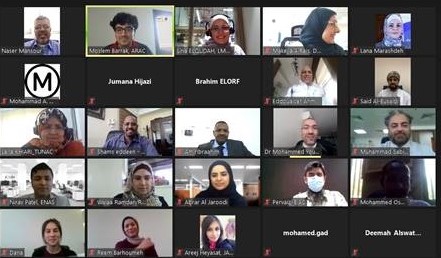
[Photo 03: Participants at the ARAC Regional Workshop on the benefits of the ARAC MLA]
3.2 Celebration of the WAD 2021
The online celebration covered interventions from ARAC and the regional partner organizations to highlight the role of accreditation in supporting the achievement of the Sustainable Development Goals (SDGs) in the Arab region. In addition, examples have been shared on how accreditation and QI services may be applied to meet objectives such as increasing trade, addressing health and safety concerns, and improving the general overall quality of output at national and regional levels.
3.3 Webinar on accreditation in the digital era
This webinar aimed to review the best experiences from the ARAC Accreditation Bodies on how they operate so far under the specific situation of COVID-19 by using information and communication technologies while, most importantly, maintaining the integrity and a robust accreditation system. The event gave ARAC AB members a common understanding and a guidance on how to go digital in a harmonized way with an adequate digitalization tools to operate efficiently and effectively.
3.4 Webinar on gender inclusivity and diversity amongst ARAC accreditation body members:
Within the framework of the implementation of the ARAC gender policy ARAC organized exchange missions amongst the men and women representatives of the national accreditation bodies in the Arab region to share experiences and success stories in the field of gender inclusivity and diversity amongst their accreditation bodies, as well as to learn on the best international practices in gender responsiveness & integration within management and leadership.
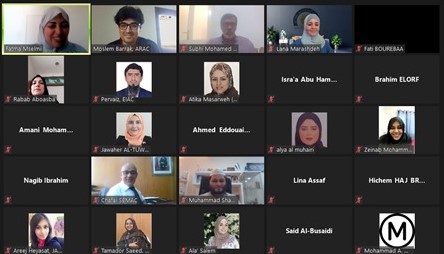
[Photo 04: Participants at the ARAC Regional workshop on gender inclusivity and diversity amongst ARAC ABs]
4. New ARAC PT programs:
Since March 2021 and with the aim to enhance the measurement capability and traceability in countries and economies of the Arab region through a better regional scientific infrastructure, the following new PT programs has been implemented under the auspice of ARAC:
Following the request of the ARAC Technical Committee to implement a third PT program on Pesticide in food ARAC launched a mapping in order to determine the number of the laboratories that can participate at this program and types or classes of pesticides. Based on the received feedback a new ARAC PT program ARAC PT 003 has been designed “Pesticides in Fruits and Vegetables” and a competent PT provider was selected to implement this PT program under the auspice of ARAC with the participation of more than 50 laboratories from the Arab region.
In addition, ARAC initiated the following three ARAC PT programs since April 2021 with the participation of more than 60 accredited laboratories in the Arab region:
It should be highlighted that that the results of the participation of the ARAC AB accredited laboratories at the ARAC PT programs are using in the Peer evaluation process conducted by ARAC with the aim to check the compliance of ARAC ABs with ILAC/IAF A2 and ARAC applicable requirements. In addition, this PT program will enhance the measurement capability and traceability of measurements in countries and economies of the Arab region through a better regional scientific infrastructure.
The contact details of ARAC Secretariat are:
ARAC Secretariat
Email : secretariat@arabarac.org
Tel: + 212 600 78 56 78
The ARAC website address is: http://www.arab-accreditation.org